sore throat runny nose diarrhea
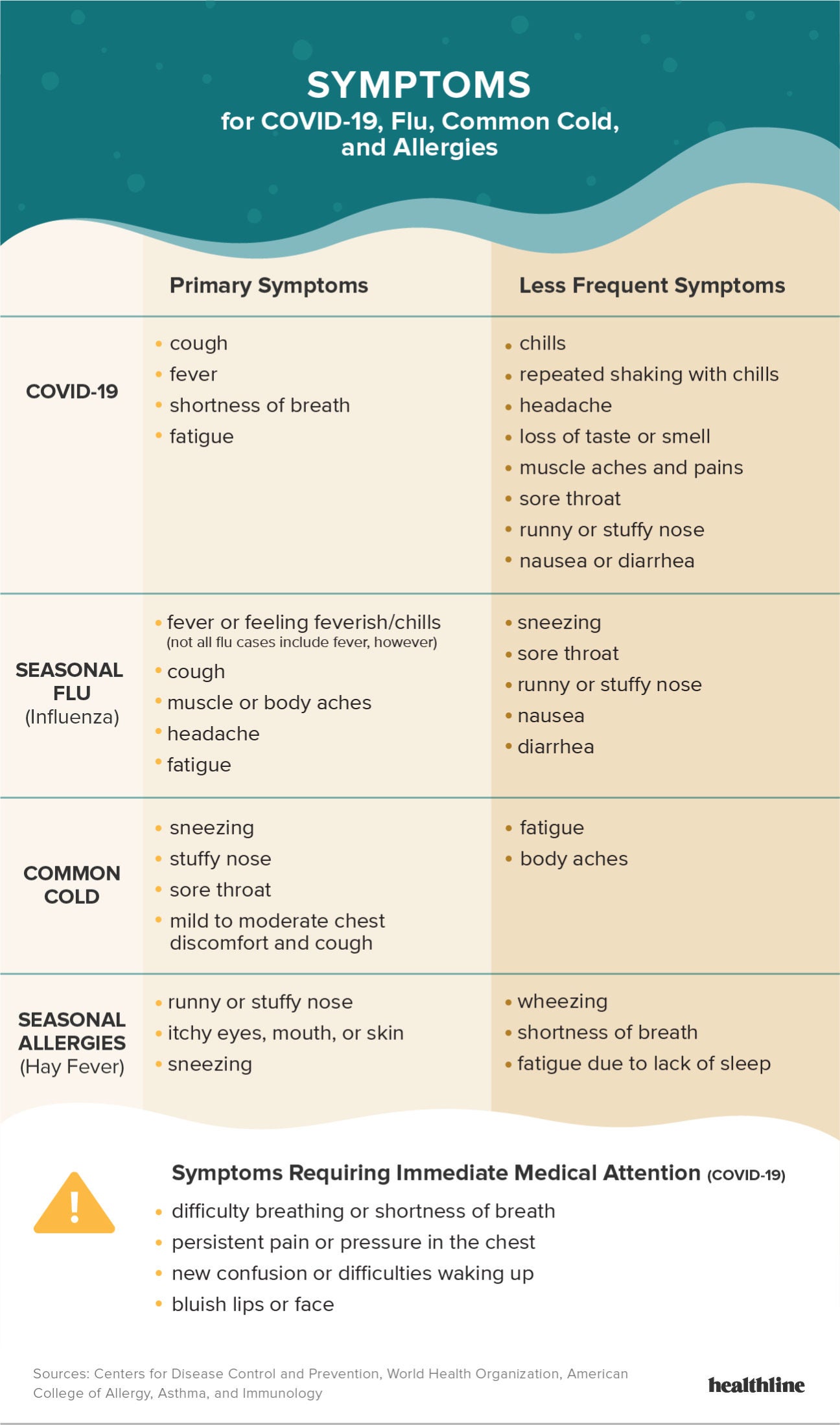 Different Symptoms for Coronavirus, Flu, and Allergies
Different Symptoms for Coronavirus, Flu, and AllergiesWhat are the symptoms of flu in children and how is it treated? Does my son have flu? The flu season is in its peak at the end of winter. in children usually begin to occur about two days after exposure to the virus. These symptoms usually last from five to seven days, although they can last up to two weeks. Symptoms of flu in children are mostly equal to adults. These symptoms include: In infants, young children and non-verbal children who cannot talk about their symptoms, you can also see increased fussibility and crying. Is it a cold or the flu? Common cold and flu are both respiratory diseases, but are caused by different viruses. Both types of diseases share many symptoms, so it can be difficult to distinguish them. They often come gradually, while the flu symptoms appear quickly. In general, your child will look more sick if they have flu that they will if they catch cold. The flu also includes symptoms that colds normally do not, such as chills, dizziness and muscle aches. Should my child see a doctor if I suspect the flu? If you think your baby may have flu, contact your pediatrician as soon as possible. For young children and older children, see your doctor if they look particularly ill or are getting worse instead of improving. Your doctor may make a diagnosis based on your child's symptoms, or give them a diagnostic test that checks the flu virus. Even if your child has already been seen by a doctor, if your symptoms get worse, take them back to the doctor or go to an emergency room immediately. Other symptoms that indicate an immediate need for urgent medical care, regardless of your child's age, include: How to handle the flu at home Your child may be at home with the flu for up to two weeks. Even after your initial symptoms sink, you may feel tired and unfavourable. Here are some ways you can take care of them at home and help improve their recovery. Keep your child comfortable One of the main things you can do for your child if they have flu is to help them feel more comfortable. Rest in bed is important, so you'll want to help them rest properly. Your child can alternate between feeling hot and cold, so get ready for blankets to come out and all day and night. The blankets are not recommended for babies as they pose a risk of asphyxiation. Instead, you may want to consider a light sleeping bag. If your child has a saline nasal drop or can help. Older children can be able to grip with hot salt water to relieve a medication.Offer over-the-counter (OTC) Based on your child's age and weight, OTC medicines, such as ibuprofen (Children's Addiction, Children's Motrin) and acetaminophen (Children's Tilenol), can help your child feel better by reducing fever and pain. Talk to your child's pediatric about what types you can use, and never exceed , even if the medication doesn't seem to be helping. Don't give your son aspirin. Aspirin may cause severe complication in children, called . Ask your doctor if the cough is recommended. Cough medicines are not or are effective for children and may have significant side effects. Keep Your Child Moisturized Your child may not have much appetite while influenza. They can go without much food while they are sick, but it is important that they take liquids to avoid dehydration. In babies, dehydration can present as a sunk soft spot on the top of the head. Others include: A is another symptom of dehydration. In babies, that's less than six wet diapers a day. In young children, there are no wet diapers for an eight-hour period. Offer fluids to your children, such as water, clear soup or sugar-free juice. It can also give young children and children unsugared potatoes or ice chips to suck. If you are breastfeeding your baby, keep trying to feed them normally. If you can't get your child to take fluids, report immediately to your doctor. In some cases, intravenous (IV) fluids may be required. Are there prescription drugs my child can take? In severe cases, prescription medications are called flu antiviral drugs. Babies, young children and children diagnosed with flu are often prescribed if they are seriously ill, hospitalized or at a high risk for . These medicines slow or stop the ability of the flu virus to continue reproducing within the body. They can help reduce the severity of symptoms, as well as shorten the length of time your child is sick. The most important thing for high-risk children can also reduce the incidence of complications, including: Children should start taking these medications as quickly as possible after diagnosis, as they are more effective if they start in the first two days of symptoms. Children are often prescribed only to be suspected of having flu, even if a definitive diagnosis has not been made. Influenza antiviral medications come in various forms, including pills, liquids and as an inhaler. There are even medicines available for babies only 2 weeks. Some children experience side effects of these medications, such as nausea and vomiting. Some medicines, including oseltamivir () may cause delirium or self-injury in children and adolescents. Talk to your child's pediatrician about the benefits and risks of these medications so you can decide what's best for your child. Who has a higher risk of flu complications? Children under 5 years of age, especially children under 2 years of age, are considered to receive flu complications. This does not mean that your child will definitely have a serious complication. It means you need to be especially alert about your symptoms. Children of any age who have an additional diagnosis of asthma, HIV, diabetes, brain disorders or nervous system disorders also have a higher risk of complications. When is the flu season and who affects? The flu season begins in the fall and continues during the winter. It usually rises somewhere between November and March. The flu season is over by the end of March. However, flu cases can continue to occur. The strain of the virus that causes the flu varies from year to year. This has shown an impact on the most affected age groups. In general, people over 65 and children under 5 are the most vulnerable to flu, as well as flu-related complications. How does the flu spread and what can it do to prevent it? The flu is very contagious and can be transmitted through the touch, on the surfaces and through microscopic and aerial drops created by cough, sneezing and talking. You are contagious one day before you feel any symptoms and will remain contagious for about a week or until your symptoms have gone completely. Children may take longer to recover from the flu and may remain contagious for a longer period of time. If you are a parent and have the flu, limit your child's exposure to you as much as possible. This is often easier to say than to do. If you can enroll a family member or a good friend to help, this is the time to call that favor. Other things you can do include: Should my child receive the flu vaccine? The Centers for Disease Control and Prevention (CDC) that all those who are 6 months old or older have one, even for years when it is not as effective as other years. Children under 6 months cannot receive the flu vaccine. It can take several weeks to make the vaccine fully effective. It is recommended that children begin the vaccination process early in the season, preferably early in October. Children under the age of 8 who have never been vaccinated before and those who have been vaccinated only once before, usually require two doses of the vaccine, although this recommendation may vary slightly year by year. These are given at least 28 separate days. The first dose of vaccine provides little flu protection. It is given to prepare the immune system for the second vaccine, which provides protection. It is imperative that your child receive both vaccines. The flu vaccine is safe for all children unless they have one of the few medical conditions. Since babies under 6 months cannot get the vaccine, it is important to avoid exposing your baby to people who may have flu. All caregivers should receive the flu vaccine. What other ways can I protect my son? There is no infallible way to completely limit your child's, but there are some things you can do: Takeaway If your child has flu or has flu-like symptoms, seek medical support. Ask your child's doctor if antiviral medications are recommended for your child. If they are, your child will have to start taking these medications within 48 hours of their first symptoms. Getting the flu vaccine is your child's best defense against flu, even if it is not totally effective. Getting the flu vaccine can help reduce the severity of your child's symptoms and decrease your chance of severe flu complications. If your child has flu and gets dehydrated, or symptoms get worse, get immediate medical help. Last medical review on March 9, 2018Read this following
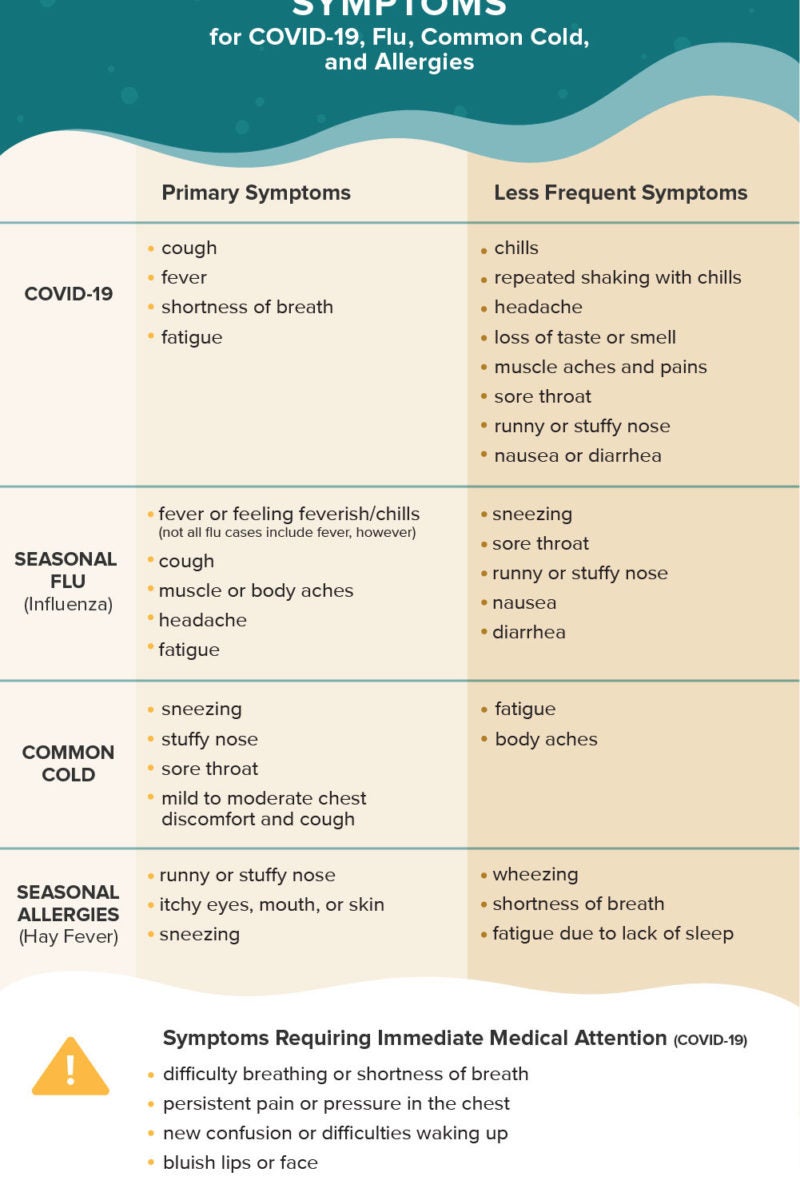
Coronavirus Symptoms: Common Symptoms, vs. Cold & More

Cold, flu, allergies or COVID-19? How to tell the difference | OSF HealthCare
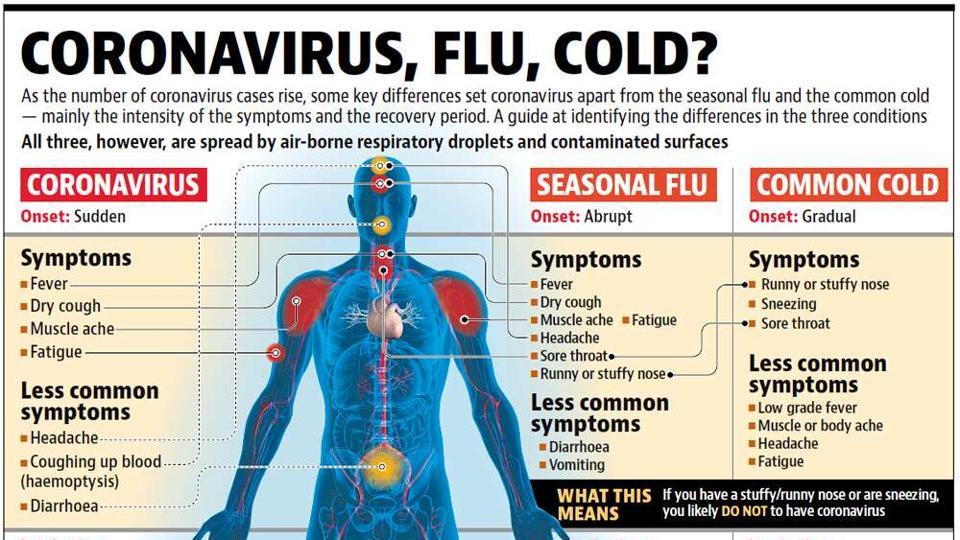
Coronavirus: How it is different from seasonal flu and common cold | Hindustan Times
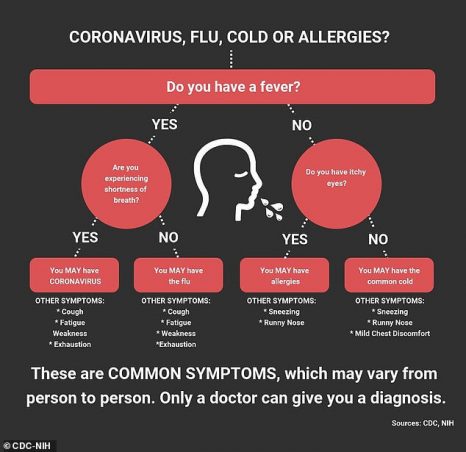
How You Can Tell the Difference Between Allergies, Cold, Flu and COVID-19 | Hartford HealthCare

Coronavirus vs. Flu: Symptom Differences, More

Are your symptoms flu or COVID-19? | Healthy You
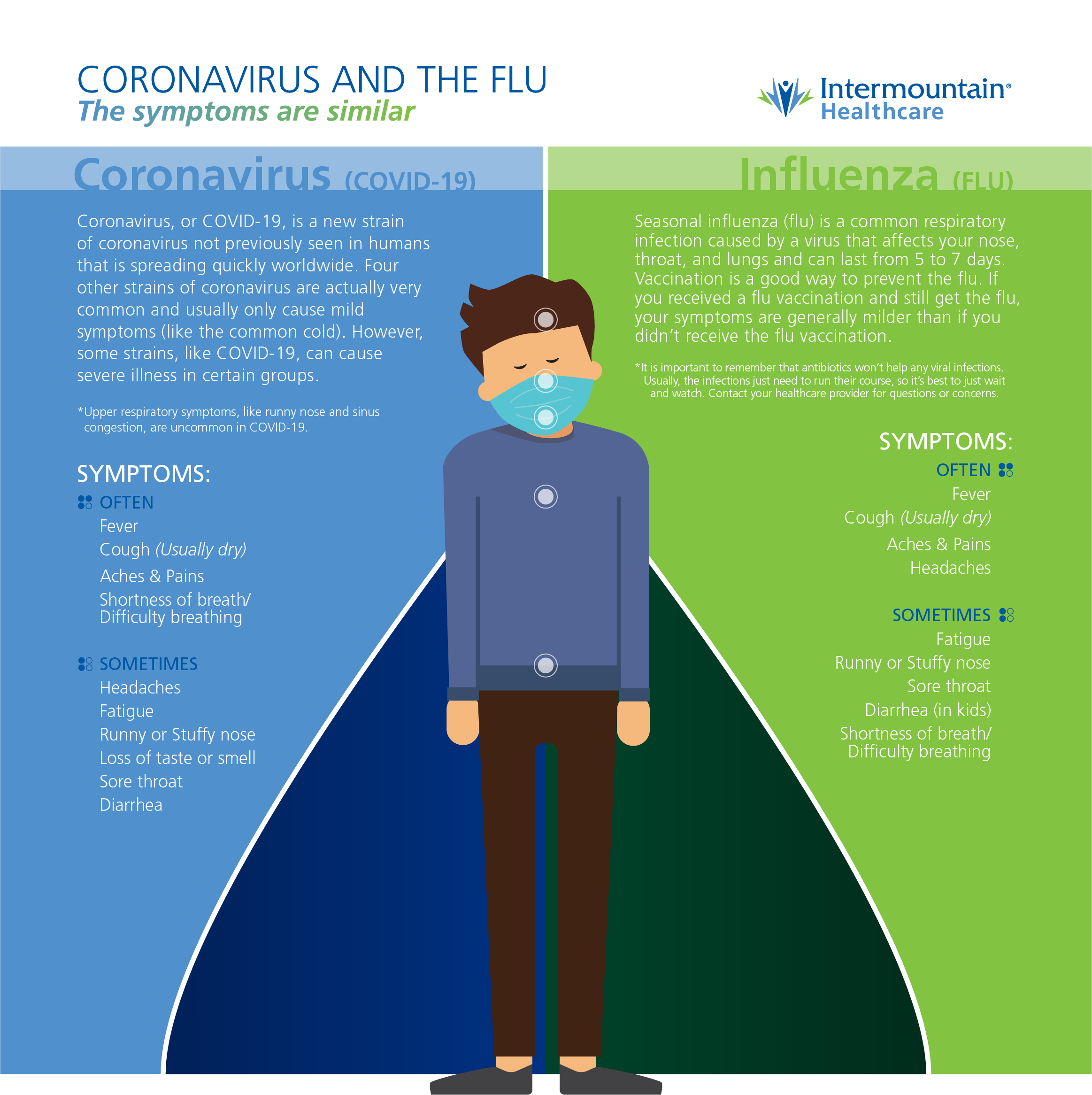
What's the difference between a cold, the flu, seasonal allergies, and coronavirus?
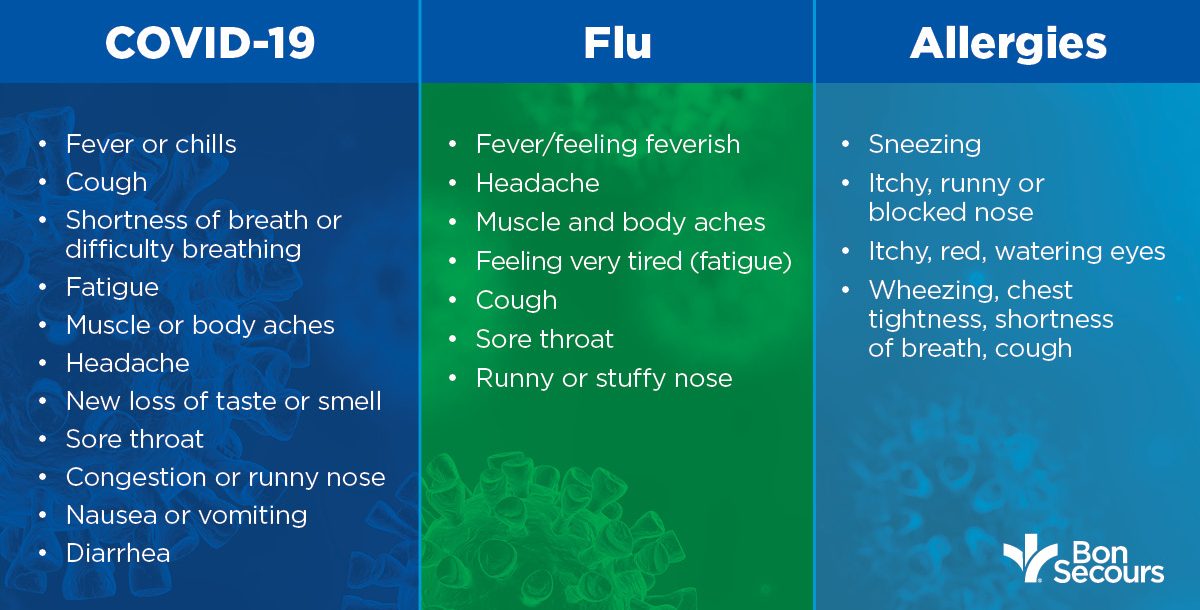
Coronavirus vs. Flu vs. Allergies | Bon Secours Blog

Coronavirus Symptoms: What to look for | News 4 Buffalo

Cold, Flu, Gastroenteristis - What are the differences? - Hutchinson Health

Are my symptoms a sign of a cold, allergies, or coronavirus? | wkyc.com

Is it COVID-19, the flu or a cold? Des Moines, Iowa (IA), MercyOne
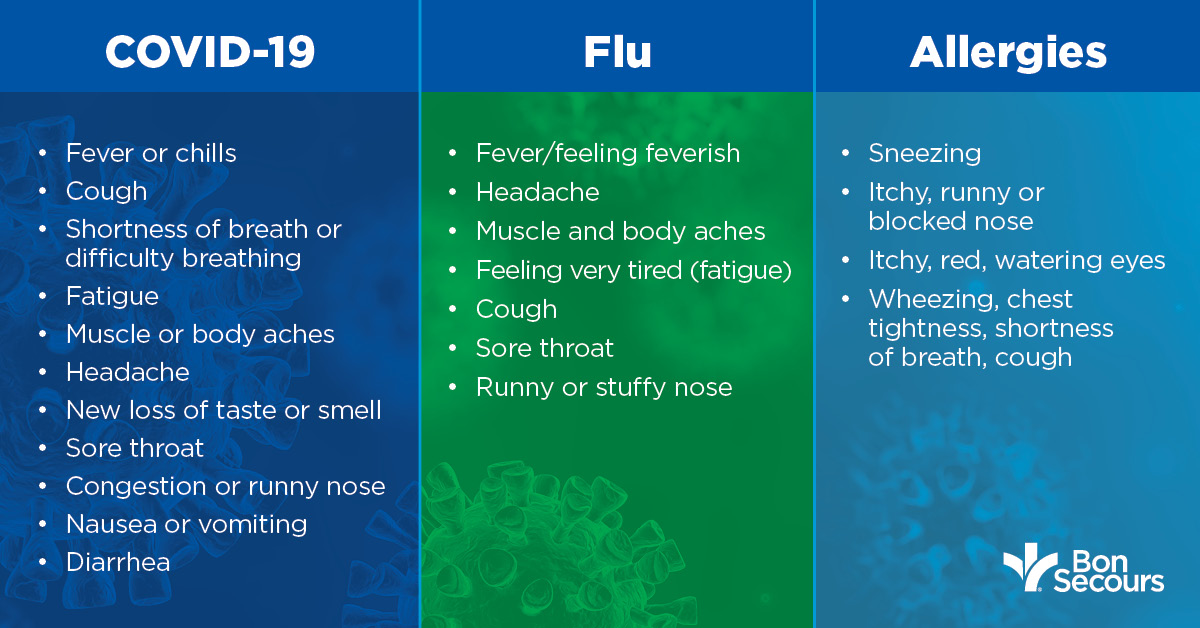
Coronavirus vs. Flu vs. Allergies | Bon Secours Blog

Legacy Preparatory Academy
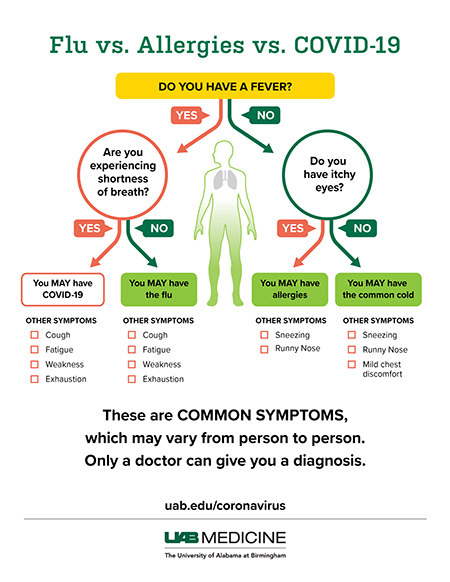
Sorting out symptoms of COVID-19, influenza, colds and allergies - News | UAB

Knowing the different symptoms of coronavirus, flu and allergies
Diabetes Canada ar Twitter: "The most common symptoms of #COVID19 are fever, tiredness, and dry cough. Some patients may have aches and pains, nasal congestion, runny nose, sore throat or diarrhea. Some
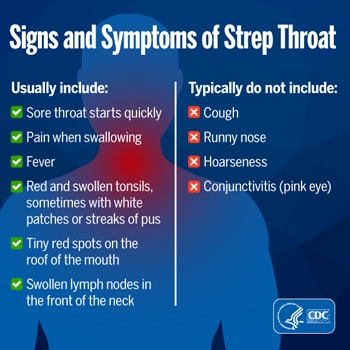
Worried your sore throat may be strep? | CDC

Coronavirus in Utah: What are the symptoms of coronavirus?

Frequently Asked Questions About Novel Coronavirus (COVID-19) – National Foundation for Infectious Diseases

Overview - Westmed
Facts about COVID-19 | Tri-County Health Department - Official Website
:no_upscale()/cdn.vox-cdn.com/uploads/chorus_image/image/66594939/Symptoms.0.jpg)
Coronavirus symptoms: How to weigh loss of taste and smell vs. fever and cough - Vox

Could My Symptoms Be Covid-19? - The New York Times

Is It Allergies or COVID-19? An Expert Helps You Tell the Difference - New Mexico Orthopaedic Associates, P.C
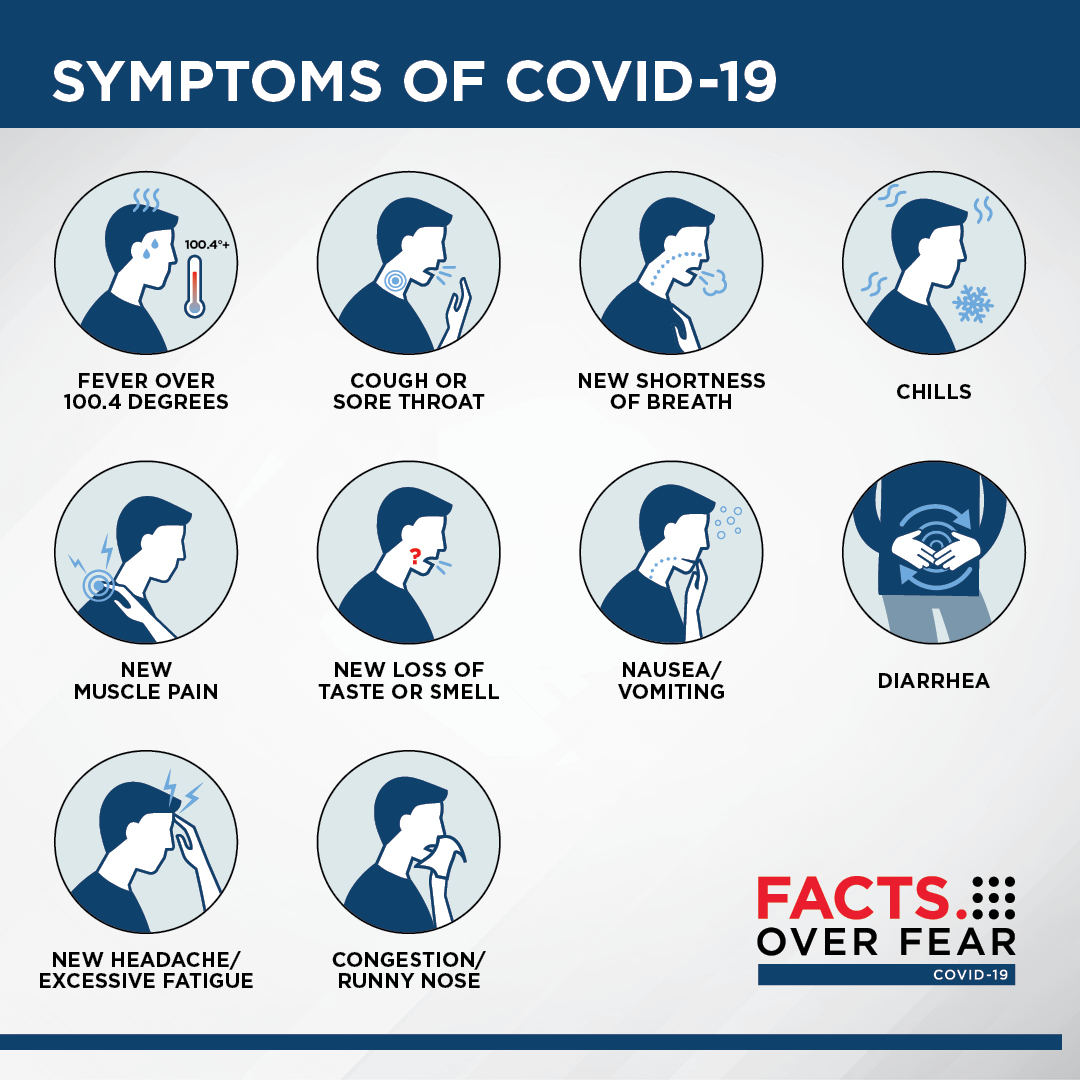
COVID-19 FAQs: How can I tell if I have coronavirus?

Is it COVID-19 or seasonal allergies? | MIT Medical

Sore Throat, Diarrhea? | Norton Children's Louisville, Ky.

CDC: New COVID-19 symptoms include stuffy nose, nausea, diarrhea :: WRAL.com

UT Health Austin
Is it coronavirus (COVID-19), the flu, a cold or seasonal allergies?

Infographic: Venn diagram of the overlap of COVID-19 symptoms with seasonal allergy symptoms | CDC
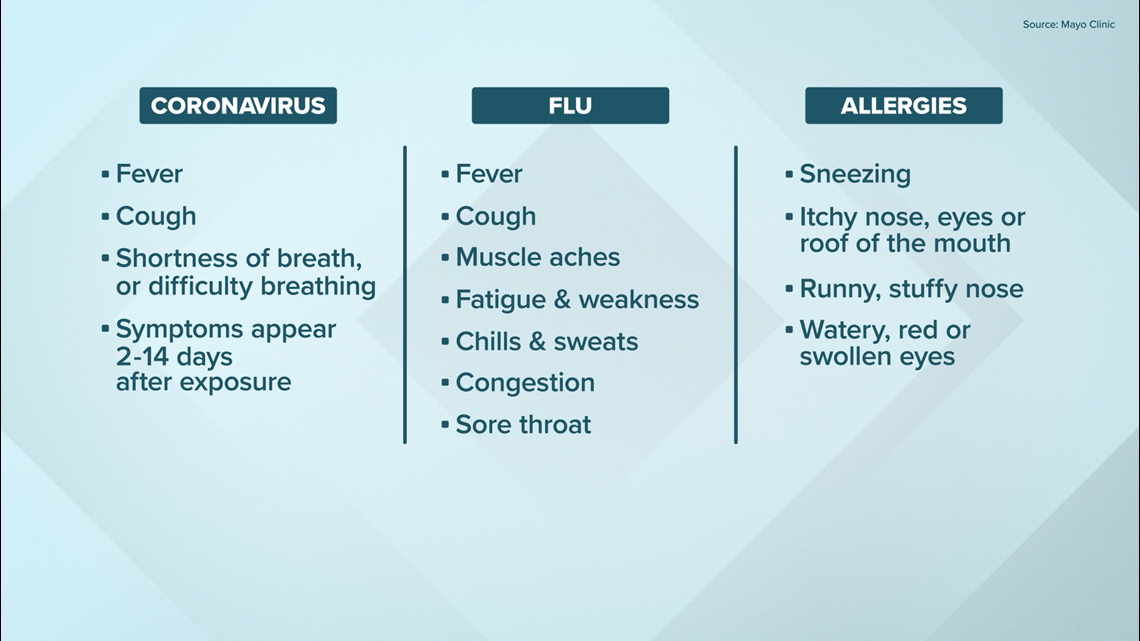
Coronavirus: Do I have COVID-19, the Flu or just allergies? | wwltv.com

Kildare Road Medical Centre - WHAT ARE COVID-19 SYMPTOMS? The most common symptoms of COVID-19 are fever, tiredness, and dry cough. Some have aches and pains, nasal congestion, runny nose, sore throat

Concerning or overhyped? Can you compare COVID to the flu? - East Idaho News

Maui High School

What to know about cold and flu season during a pandemic

Understanding the Differences between COVID-19 and Flu - Greater Living - GBMC HealthCare
Ohio Dept. of Aging auf Twitter: "Could you have #COVID19? Mild to severe symptoms can appear 2-14 days after exposure: 🤒 Fever/chills 🤒 Cough/Shortness of breath 🤒 Fatigue/Body aches 🤒 Sore throat/Runny
Posting Komentar untuk "sore throat runny nose diarrhea"